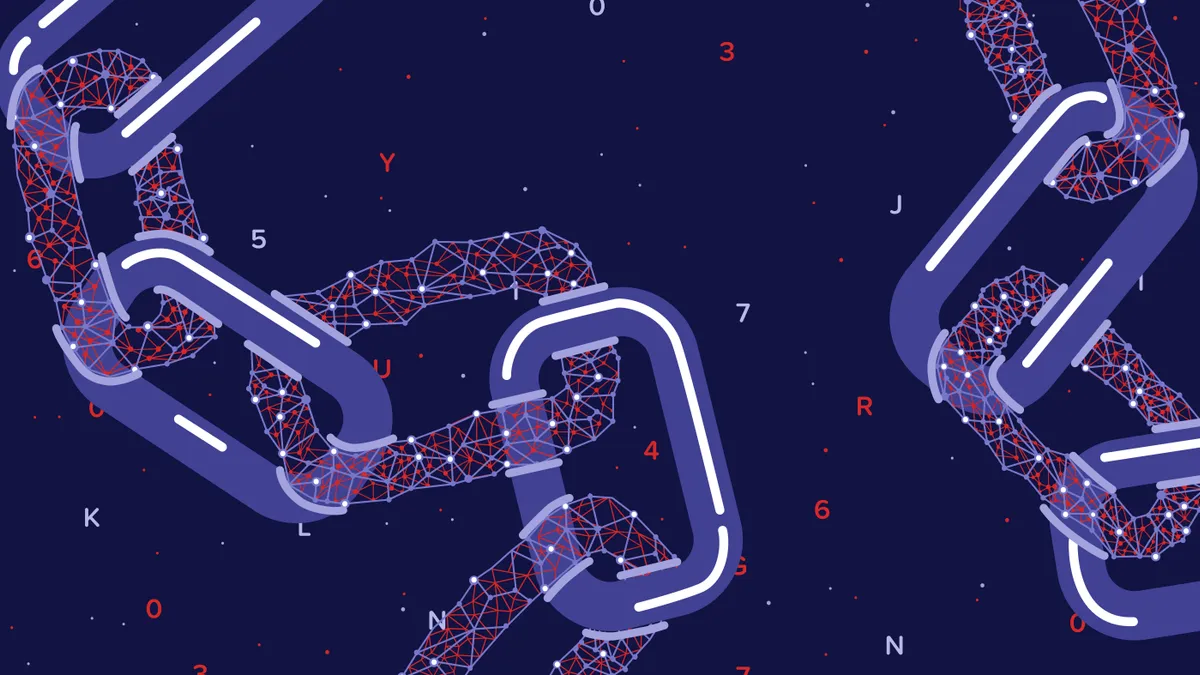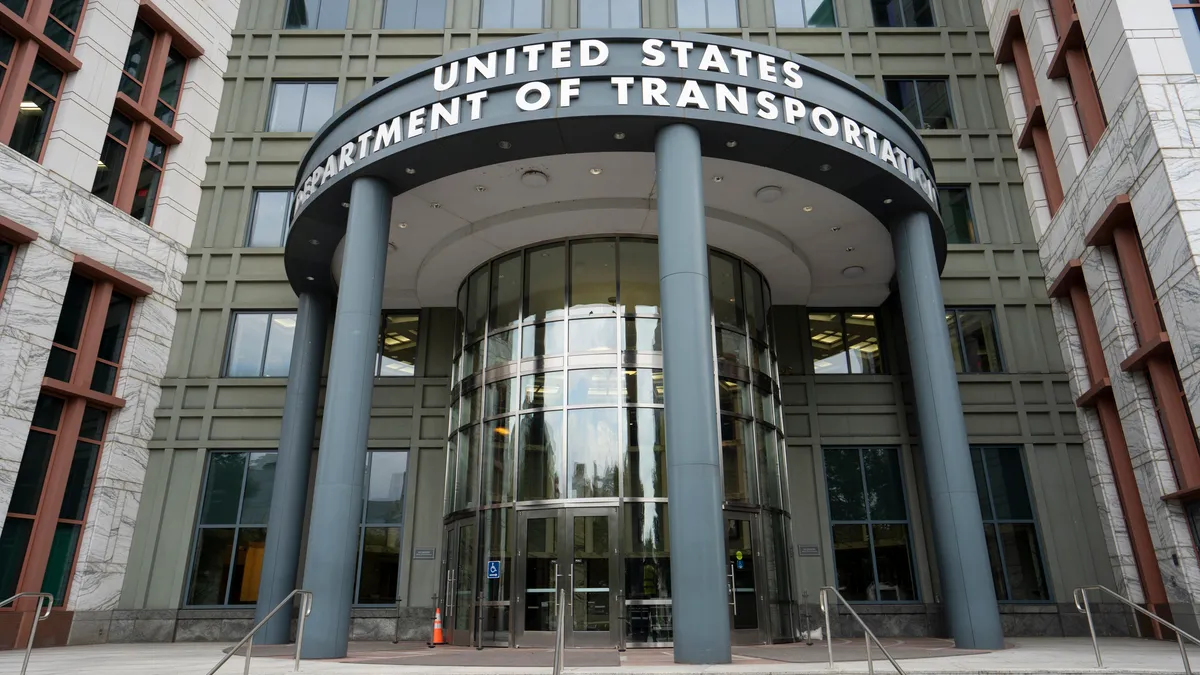The waste and recycling industries aren't always considered spaces that overlap with the tech sector. But some industry innovators are finding ways to successfully incorporate emerging blockchain technologies into their business models.
Blockchain is considered a highly secure, decentralized system that can be used for a variety of transactions between two parties, making it ideal for waste and recycling applications. The concept is expected to touch and transform every global industry in the next 10 years.
Blockchain is a digital record storage system that connects a growing list of encrypted records, or "blocks." The decentralized ledger catalogs transactions on multiple computers within a network, and people known as "miners" provide transaction validation or a "proof-of-work." It is the concept on which cryptocurrencies — such as bitcoin, a currency product that is based on the operating concept of blockchain — were built, in part because its enhanced security makes the record chain unalterable, and such a system has not yet been hacked.
Bettering business with blockchain
Smart contracts currently prove the most commonly explored use, in which contract details are written into the blockchain metadata. Smart contracts boost transparency and reduce fraud because they cannot be altered, instead requiring an entirely new information block to be added to make changes, essentially as an amendment to the original document. They also increase privacy by offering greater protections over individual user data.
Smart contracts present opportunities for haulers and material processors to create secure deals with clients, including municipalities and manufacturers. They also can be used for agreements for land purchases, equipment vendors, consultants or other partnerships along the supply chain.
"Blockchain and smart contracts go together hand-in-hand," said Shaun Frankson, Plastic Bank co-founder and chief digital strategist. In fact, when many people think they're talking about blockchain as a general concept, "they're actually talking about the smart contract features."
Plastic Bank is a global network of micro-recycling markets that empowers people in developing countries to pick up plastics and get rewarded through blockchain-backed cryptocurrencies. Each piece of plastic a person recovers from the environment, households or businesses is turned in at a Plastic Bank location run by a local entrepreneur who oversees the community's plastic recycling program. The plastics are sorted by type, color and weight and are sold directly to end-use manufacturers, and the individuals who brought in the plastics receive cryptocurrency compensation.
Blockchain's security and verifiability features make it ideal for use in countries in which Plastic Bank operates that struggle with high rates of poverty as well as less transparent and more corruptible financial systems, such as Haiti, Indonesia, Brazil and the Philippines.
Incorporating blockchain into Plastic Bank's business model "unlocked some of the pain points we've come to realize, such as that in most of the communities we operate in, people don't qualify for bank accounts, and it's very dangerous for them to save large amounts of cash," Frankson said, adding that this provides "different ways people can cash out that token when it's safe and appropriate or keep using it in those local token ecosystems."
The local token ecosystems include trading recovered plastics for non-cash rewards such as solar cell phone charging minutes, cooking fuel, school tuition and school supplies. Plus, blockchain aids Plastic Bank's cryptocurrency system in a similar way, "as with smart contracts because we can add those crystal clear conditions on when a token can be used," Frankson said.
Verification is a top blockchain use. In the waste and recycling space, businesses often use it to verify service delivery and receipt of payment.
Food waste company Goodr uses blockchain for verification purposes as well. The Atlanta-based business recovers surplus food from restaurants and businesses for donation instead of disposal. Participating food businesses schedule pickups and verify delivery through the Goodr app in addition to viewing data trends about the types and amounts of food they're discarding.
"When we go and pick up items, we're checking that what the customer entered is what we're recovering — but the blockchain is really backing up everything," said Jasmine Crowe, Goodr founder and CEO. "It really came from the idea of all the times I've been in a grocery story and donated food to some charity, but you never really know for a fact that that food actually made it out of the grocery store."
Goodr charges businesses for pickups just like other waste management models, but the charities receive the recovered food for free. Crowe said she got the idea to innovate with blockchain when she read about how the concept was used to verify real estate and mortgage transactions. "It's a new thing to everybody else and a trending topic, but we were talking about using blockchain in our technology [early] last year," she said.
"We weren't issuing cryptocurrency, we weren't purchasing things with blockchain, but more so just being able to show through the verification process that the [charity] did get this food," Crowe said. "The biggest piece for us is making sure the customer can verify that the food actually made it to someone in need."
Plus, blockchain helps with "making sure all of our numbers are real, because we are dealing with potential tax savings for customers as they're donating items," Crowe said. "We want to make sure that they can't go back in and fudge the numbers, that if the IRS ever comes to them and says 'How is it that you guys have $5,000 worth of tax write-offs?' that we have this ledger in place."
Improving recycling rates
While blockchain serves as a more secure and verifiable way to carry out transactions, the industry also employs the concept for boosting recycling rates.
Relying on cryptocurrency, for example, changes the metric for commodity valuation and makes individuals' participation more worthwhile. "We need to bring stability to recycling. Especially with plastic recycling, it's quite often directly correlated to petroleum prices," which can plummet and make virgin material more valuable than recovered items, Frankson said. "80% of ocean plastic is coming from developing countries where there's almost no waste management system. So how do we reveal the value in plastic? We wanted to make plastic too valuable to go into the ocean."
Plastic Bank’s blockchain-backed incentives have exhibited success with increasing recycling program participation. The concept has the potential to improve consumer recycling in the U.S. context in similar ways.
Likewise, Goodr's food waste diversion model employed on a larger scale could increase domestic commercial food recovery rates and make its way into residential organics collection programs. The business already has plans for expansion to new sectors and geographic locations in the coming months.
"Right now we're doing the edible surplus diversion, but we now have access to our first anaerobic digester. We'll be helping our customers turn food waste into fuel and other items," Crowe said. "We'll be announcing the next two launch cities by the end of this year, and we're getting all of our pilots set up to move forward in 2019."
Emerging markets
Although the use of blockchain slowly is trickling into the waste and recycling industries, its full potential has not yet been realized.
Four New York power utilities recently announced a collaboration to determine new uses for blockchain in their industry, and they mentioned potential partnerships with community solar companies. That could be another area of blockchain opportunity for the waste industry as well, considering the emerging market for turning capped landfills into solar panel fields.
In addition to finding their own uses, waste and recycling businesses can study how other industries innovated with blockchain and incorporate best practices, just as Goodr's Crowe did with transforming a real estate industry idea into a food recovery strategy.
Other innovative concepts certainly will come to light in the coming years as more businesses integrate blockchain into their operations and experience its benefits. But one thing increasingly seems evident: Waste and recycling businesses are getting in on the forefront of the blockchain movement and the industries are not going to be left behind other tech-forward sectors.























